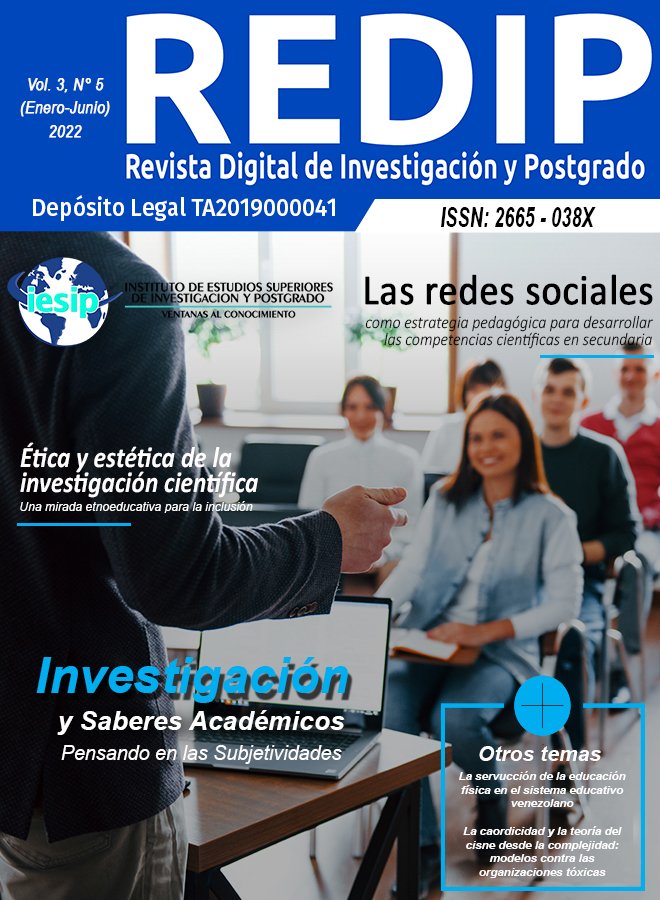Educational trends in the classrooms of the future
DOI:
https://doi.org/10.59654/11y10671Keywords:
Educational trends, classrooms of the future, educational innovation.Abstract
Education today has to be in harmony with the changes that societies promote as a result of technological
and scientific transformations. Many studies and theories affirm the need to contextualise educational dynamics based on social realities, and globalisation is an undeniable reality. However, educational processes continue to promote traditional and rote practices, which reveals a gap between education, reality and society. In this sense, the study aimed to analyse educational trends in the classrooms of the future. The methodology used was adjusted to the post-positivist
paradigm, which allowed for an interpretation of the pedagogical experience of teachers in Colombia,
particularly in the department of Magdalena, emphasising the phenomenological method. The instrument for the collection of information was the interview, carried out with 8 teachers from the educational institutions of Plato, the information was processed by means of the categorisation and triangulation method. The findings of the study showed that the new educational trends in the classrooms of the future point to a virtual education or a combination of two faceto-face and virtual educational systems, the first one rescuing the human approach, teacher-teachers and students-students. The second aims to prepare students to be able to face the challenges that globalisation and societies impose. Likewise, the categories that emerge from the study have a direct implication with: digital responsibility, technological competences, collaboration within new educational spaces, innovative pedagogy, life skills and work preparation, student-led learning and new connections that involve new ways of thinking.
Downloads
References
Acosta, P. (2020). Aprendizaje cooperativo para el perfeccionamiento epistemológico en la construcción de saberes en el área de lenguaje. (Tesis doctoral) Universidad Pedagógica Experimental Libertador. Venezuela.
Barrios, M. (2017). Herramientas web como estrategia pedagógica para desarrollar el pensamiento científico en estudiantes de secundaria de Tenerife Magdalena. (Tesis Doctoral). Universidad Rafael Belloso Chacín. Maracaibo-Venezuela
Cabero Almenara, J. (2007). Nuevas Tecnologías Aplicadas a la Educación. Mc Graw Hill.
Casado, M. A., Garitaonandia, C., Jiménez, E., Garmendia, M., Karrera, I., y Moreno, G. (2018). Los cursos/materiales/el-paradigma-cualitativo-en-la-investigacion-socio-educativa.pdf
Padrón, J. (1992). Aspectos Diferenciales de la Investigación Educativa. UNESR. Caracas. Venezuela.
Taylor, S. J. y Bogdan, R. (2008). Introducción a los métodos cualitativos de investigación. La búsqueda de significados. Paidós.niños de la brecha digital en España. Unicef.
Castro, Santiago y Guzmán, Belkys y Casado, Dayanara (2007). Las Tic en los procesos de enseñanza y aprendizaje. Laurus, 13 (23), 213-234. https://www.redalyc.org/articulo.oa?id=761/76102311
Gurdián, A. (2007). El Paradigma Cualitativo en la Investigación Socio - educativa. Agencia española de Cooperación Internacional. https://web.ua.es/en/ice/documentos/re-ursos/materiales/el-paradigma-cualitativo-en-la-investigacion-socio-educativa.pdf
Padrón, J. (1992). Aspectos Diferenciales de la Investigación Educativa. UNESR. Caracas. Venezuela.
Taylor, S. J. y Bogdan, R. (2008). Introducción a los métodos cualitativos de investigación. La búsqueda de significados. Paidós.
Published
Issue
Section
License
Copyright (c) 2021 Revista Digital de Investigación y Postgrado

This work is licensed under a Creative Commons Attribution-NonCommercial-ShareAlike 4.0 International License.










